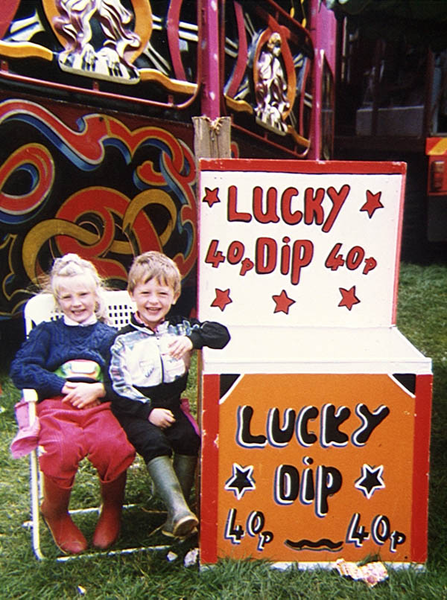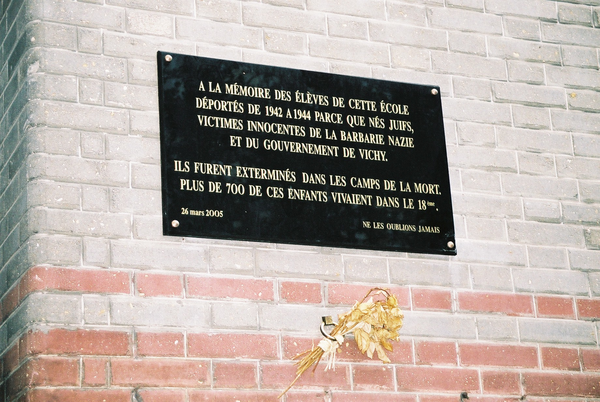Browse by Tags: children
 | Up a level |
Number of items: 16.
Creating Stories for Children 1
Shared with the World by Mr Billy Brick
A word document including teachers notes from the module "Creating Stories for Children". Students are asked to define the various forms of children's stories and to differentiate between age groups. The teacher's notes provide numerous definitions and examples and the materials are suitable for level 2 undergraduate students.
Shared with the World by Mr Billy Brick
Creating Stories for Children 2
Shared with the World by Mr Billy Brick
A word document from the module "Creating Stories for Children". Students are asked to categorise a number of children's stories and to differentiate between age groups.
Shared with the World by Mr Billy Brick
Creating Stories for Children 3
Shared with the World by Mr Billy Brick
A word document including teachers notes from the module "Creating Stories for Children". Students are taught how to generate ideas and critically analyse what type of stories publishers are looking for. The materials are suitable for level 2 undergraduate students.
Shared with the World by Mr Billy Brick
Creating Stories for Children 4
Shared with the World by Mr Billy Brick
A word document from the module "Creating Stories for Children". Students are taught how to plan their stories and create convincing plots. The materials are suitable for level 2 undergraduate students.
Shared with the World by Mr Billy Brick
Creating Stories for Children 5
Shared with the World by Mr Billy Brick
A word document including teachers notes from the module "Creating Stories for Children". Students are taught how to create characters and their nemesis. The materials are suitable for level 2 undergraduate students.
Shared with the World by Mr Billy Brick
Fairground Images: Charlotte and Luke Francis
Shared with the World by Dr Matt Phillpott
Charlotte and Luke Francis, photographed August 1993. This resource is the copyright of the National Fairground Archive, University of Sheffield (http://www.nfa.dept.shef.ac.uk/) and has been made available with their permission. Some rights reserved (see terms of licence by clicking on the CC licence logo below).
Shared with the World by Dr Matt Phillpott
Hull Fair, Fun for All DVD: Early Days: Beginnings: Early History
Shared with the World by Dr Matt Phillpott
Extracts from the Hull Daily Mail and World's Fair newspapers during the 1890s, accompanied by films of Hull Fair from 1902 by Mitchell & Kenyon. The extracts are read by John Alibone, Donald Campbell, Chris Church, John Horsley and Chris Wilson.
This resource was created as part of the National Fairground’s project, ‘Hull Fair, fun for all’, funded by the Heritage Lottery Fund in association with Hull City Council (see http://www.hullfair.dept.shef.ac.uk). The resource is the copyright of the National Fairground Archive, University of Sheffield (http://www.nfa.dept.shef.ac.uk/) and has been made available with their permission. Some rights reserved (see terms of licence by clicking on the CC licence logo below).
Shared with the World by Dr Matt Phillpott
Le jeu des sept familles europeennes
Shared with the World by Mrs Alix Creuzé
Jeu des 7 familles : fiches professeur et eleve
A partir du site de pratique du francais "Enfants nomades", le professeur propose une activite de groupe : creer un jeu des 7 familles européennes. Les enfant (8-12 ans, niveau A1-A2) pourront ensuite partager leurs familles sur le site et jouer avec des familles creees par d'autres classes. Ce projet permet de reflechir sur les stereotypes interculturels en plus du travail en français sur le lexique de la famille. Il invite aussi a communiquer avec d'autres enfants apprenant le francais ou francophones.
Shared with the World by Mrs Alix Creuzé
Observing the 1980s: Mass Observation Special Report #209
Shared with the World by J Scantlebury
Listed here are links to Mass Observation Special Reports in the University of Sussex Special Collections catalogue, digitised as part of the Observing the 1980s Project. Users can click on additional links to a PDF of the panel member's report, and to an entry in the catalogue providing more information about them. Special Reports is the term given to spontaneous responses from Mass Observation Project Panel members, writing either outside the range of Directive topics or sending in further comment on a subject already covered at an earlier date. The Special Reports were selected for their relevance to themes addressed in the undergraduate history course ‘1984: Thatcher’s Britain’ at the University of Sussex.
Shared with the World by J Scantlebury
Observing the 1980s: Mass Observation Special Report #280
Shared with the World by J Scantlebury
Listed here are links to Mass Observation Special Reports in the University of Sussex Special Collections catalogue, digitised as part of the Observing the 1980s Project. Users can click on additional links to a PDF of the panel member's report, and to an entry in the catalogue providing more information about them. Special Reports is the term given to spontaneous responses from Mass Observation Project Panel members, writing either outside the range of Directive topics or sending in further comment on a subject already covered at an earlier date. The Special Reports were selected for their relevance to themes addressed in the undergraduate history course ‘1984: Thatcher’s Britain’ at the University of Sussex.
Shared with the World by J Scantlebury
Observing the 1980s: Mass Observation Special Report #930
Shared with the World by J Scantlebury
Listed here are links to Mass Observation Special Reports in the University of Sussex Special Collections catalogue, digitised as part of the Observing the 1980s Project. Users can click on additional links to a PDF of the panel member's report, and to an entry in the catalogue providing more information about them. Special Reports is the term given to spontaneous responses from Mass Observation Project Panel members, writing either outside the range of Directive topics or sending in further comment on a subject already covered at an earlier date. The Special Reports were selected for their relevance to themes addressed in the undergraduate history course ‘1984: Thatcher’s Britain’ at the University of Sussex.
Shared with the World by J Scantlebury
Observing the 1980s: Mass Observation Special Report #971
Shared with the World by J Scantlebury
Listed here are links to Mass Observation Special Reports in the University of Sussex Special Collections catalogue, digitised as part of the Observing the 1980s Project. Users can click on additional links to a PDF of the panel member's report, and to an entry in the catalogue providing more information about them. Special Reports is the term given to spontaneous responses from Mass Observation Project Panel members, writing either outside the range of Directive topics or sending in further comment on a subject already covered at an earlier date. The Special Reports were selected for their relevance to themes addressed in the undergraduate history course ‘1984: Thatcher’s Britain’ at the University of Sussex.
Shared with the World by J Scantlebury
President Chirac's (1995-2007) stance on the Vichy regime and antisemitism.
Shared with the World by Mr Emmanuel Godin
After President Chirac's official recognition (1995) that France actively participated in deportation of Jews, commemorative plaques were erected on the wall of each Parisian school stipulating the number of children who had been deported in each 'arrondissement'. (Here a plaque in the XVIII arrondissement, from which more than 700 Jewish children were rounded up by the French police before being deported). Chirac's 1995 discourse (here included in French) about the responsibility of the French state in the deportation of Jews marked a departure from the previous Gaullist orthodoxy. On the occasion of the official opening of the new exhibition in the French pavilion of the Auschwitz-Birkenau Memorial and Museum in January 2005, President Chirac reflected on the impact of the Holocaust on France (text in English). A few days before, President Chirac inaugurated the 'Memorial de la Shoah' in the IV arrondissement of Paris. Just outside the Memorial, 'Le Mur des Justes' (Righteous among the Nations) commemorates the French people who risked their lives to save Jews from extermination during the Occupation (6 photos included). Facing the 'Murs des Justes', in a street recently remaned 'Allée des Justes', a commemorative plaque adornes the door of the local secondary school (College Frederic Couperin, Photo included. It reminds passers-by that out of the 11,000 Jewish children arrested by the Vichy police in France between 1942 and 1944, 500 came from the 4th arrondissement of Paris. They were deported to Auschwitz.
A Weblink to the INA site (Institut National de l'Audiovisuel) will enable visitors to see how the French television channel France 2 covered the event. This resource also includes a link to the Memorial de la Shoah in Paris, a site which provides invaluable resources (see in particular its 'Centre de Documentation Juive Contemporaine'.
Students with a good understanding of postwar politics and history may want to use these sources to explain why Chirac broke from the postwar Gaullist narrative.
Shared with the World by Mr Emmanuel Godin

Short Stories for Children
Shared with the World by Mr Billy Brick
A collection of five resources dealing with the process of writing fiction for children.
Shared with the World by Mr Billy Brick
Show don’t Tell
Shared with the World by Mr Billy Brick
A .ppt presentation from the module "Creating Stories for Children" which explains why it is better to show the reader rather than tell them. The presentation provides numerous examples and is suitable for using with level 2 undergraduate students.
Shared with the World by Mr Billy Brick
The 'Disenchantment' of Early Modern Europe: Seminar 05: Patriarchal Authority: Princes and Fathers
Shared with the World by Dr Matt Phillpott
Seminar outline for HST115: The 'Disenchantment' of Early Modern Europe c. 1570-1770, produced for the 2007 session at the Department of History, University of Sheffield.
Shared with the World by Dr Matt Phillpott
![[img]](http://www.humbox.ac.uk//360/1.hassmallThumbnailVersion/00380084.jpg)

![[img]](http://www.humbox.ac.uk//548/1.hassmallThumbnailVersion/Histroy_and_memory_France_Paris_antisemitism_deporation_school.jpg)



